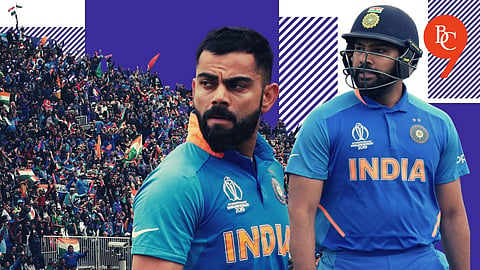

The 2021 T20 world cup has concluded as Australia defeated New Zealand by eight wickets thanks to a powerful 77-run knock by Mitchell Marsh. But for Indian fans, the world cup has been a bitter disappointment. Before the start of the tournament, India was the favourite to win the World Cup. But like every other ICC tournament in the past seven, the Indian team has once again failed to live up to the “favourites” tag.
Starting from the 2014 T20 World Cup, India lost to Sri Lanka in the final; then to Australia in the 2015 50-over World Cup, in 2016 to West Indies in the T20 World Cup semi-finals; to Pakistan in the 2017 Champions Trophy finals and lost to New Zealand in the 2019 50-over World Cup semi-finals.
But during this period, the Indian team has been a top-five team in all formats. This raises the question of why the team struggles in the ICC events. Let us take a deeper look at India’s slump in the ICC tournaments.
India - Not fearless enough?
Former England captain Nasser Hussain while talking to t20worldcup.com threw light on how the Indian team doesn’t play fearless cricket. He said, "You have got to go out and express yourself. They (India) have got so much talent. That may be the only thing that's holding India back in ICC events. They don't quite play the fearless brand of cricket that they deserve to because they are so talented."
The reasons behind India’s conservative form of cricket can stem from overtly high expectations from its fans. India has a huge cricket fanbase who consider the sport a religion where winning is the only way to please the cricketing Gods. In the past, there have been countless instances where the fans have taken adverse steps to express their anger towards the team’s loss.
One such incident took place when India lost to Sri Lanka in the 1996 World Cup semi-finals in Kolkata’s Eden Gardens stadium. The fans started burning the stands and throwing objects on the field. In 2007 something similar happened as the Indian team crashed out of the 50-over World Cup where people pelted stones at homes of cricketers and burned effigies of players like Rahul Dravid, Mahendra Singh Dhoni and Virendra Sehwag.
Along with the pressure from fans, the players also have the pressure to maintain their place in the team. Over the last decade, the Indian team has emerged as a powerhouse, thanks to its ever-growing talent pool. Players need to be on their A-game to solidify their place in the team or else they would be out of the team.
Hence, with the combination of unreal expectations and constant pressure, the Indian team prefers playing a risk-aversive brand of cricket. The team wants to be in the game, unlike going hell for leather and failing. They take the game deep, a style adopted from captain cool, MS Dhoni himself. This approach pushes them to play conservative cricket.
Over - exhaustion
The last ICC trophy India won was the 2013 Champions Trophy, where the team was undefeated throughout the tournament. In the year leading to the Champions Trophy, the Indian team had played 31 international matches across all three platforms and the IPL.
Whereas before the 2021 T20 World Cup, India had played 27 international matches just in 2021 with an IPL which concluded on October 15, just two days before the start of the world cup. These numbers are staggering, especially when you consider all matches were played during the pandemic and required the team to live in a bio-bubble. The increased number of matches has certainly exhausted the team. The former coach of the Indian team, Ravi Shastri, stressed the over-exhaustion of the players in a recent interview with India Today.
He said, "We lacked the daring and that can happen when you are fatigued mentally. When you look at the amount of time, these boys have spent in a bubble, it can happen there like it happened against New Zealand. You need that spark, that x-factor to kick in, and it doesn't. This is not an excuse, but it didn't happen that day. I'll put my hand up and say we lacked the daring in that game against New Zealand."
The combination of these reasons has hindered the Indian team from winning ICC tournaments. But now, with Rahul Dravid at the helm, the future is bright for the Indian team. Dravid has single-handedly revolutionised the junior team and National Cricket Academy, creating several superstars on his way. Hence, now with him holding the reins, Indian fans can expect a lot more success and, hopefully, ICC trophies in the future.
